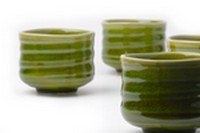Solving problems every tea drinker faces.
Exclusive subscriber benefits:
Receive four FREE quality ebooks worth $60
-
Save at least $5 during your first purchase
Green tea ingredients are extremely complex. It contains as many as 200 bioactive compounds. Not only are they complex, being plant material, their levels also extreme variable and change with location, harvesting season and making process.
However, over the past 20 years, scientists have discovered that most of its health benefits can be explained by the Big Three:
The largest and most important chemical compound is polyphenols. Why are polyphenols so important? This is because they contain flavonoids - an important class of antioxidants.
But high levels of polyphenols make bad green tea. This is because they are astringent (a dry mouth feeling) tasting. Therefore Chinese and Japanese green tea plants tend to have lower level of polyphenols than black tea plants.
Green tea drinkers are compensated by the presence of another delicious compound: theanine, which I will explain later. The best green tea is harvested in spring when the theanine to polyphenol ratio is the highest.
Catechins
The most important nutrition in tea polyphenols are catechins. According to scientist Graham Harold, dried tea extract can contain 30% to 40% of catechins. The four main catechins are:
EGCG
The star of the show, of course, is EGCG. Found in the highest concentration in green tea, it is the most active and best researched of all green tea ingredients.
Put it simply, it explains most of green tea health benefits.
It has been found to be over 100 times more effective in neutralizing free radicals than vitamin C and 25 times more powerful than vitamin E.
It also tops other antioxidants, such as butylated hydroxyanisole (BHA), butylated hydroxytoluene (BHT) and resveratol.
Other Polyphenols
 Dried leaves can contain 7% to 14% of other
flavonoids compounds.
Dried leaves can contain 7% to 14% of other
flavonoids compounds.
About two thirds of these flavonoids are flavonols such as kaempferol, quercetin, and myricetin. Also powerful antioxidants, they are known to be anti-histamine and anti-inflammatory.
Dry green tea contains 2% to 3% of theogallin, which is unique only to tea. It also contains depsides such as chlorogenic acid and coumarylquinic acid.
Theanine
Dried tea extract contains 4% to 6% of theanine, an amino acid found only in tea. It is what gives tea the characteristics flavor. Catechins and caffeine taste bitter and astringent, but theanine tastes sweet and fresh.
Catechins have been drumming their benefits in recent years. But it is for theanine that tea lovers have yearned for centuries.
Feel caffeined out? Lacking some sleep? Feeling stress? Theanine stimulates alpha brain waves, calms the body and promotes relaxed awareness. It is the interplay between catechins, theanine and caffeine that makes green tea such a fascinating beverage.
Theanine - 10 Astonishing Facts To Know
Caffeine
Caffeine is a plant alkaloid found in coffee, tea and cocoa. It acts as natural pesticide, protecting plants against certain insects feeding on them.
Green tea contains alkaloids known as methylxanthines such as caffeine, theobromine and theophylline.
Graham found that fresh leaves contain, on average, 3% to 4% of caffeine and very small amounts of the other methylxanthines.
Are you ready to explode the myths about caffeine?
Vitamins and Minerals
Green tea contains several B vitamins and C vitamin. Being less processed than black tea, these vitamins are left intact in the tea-making process.
Other green tea ingredients include 6% to 8% of minerals such as aluminium, fluoride and manganese.
Green tea also contains organic acids such as gallic and quinic acids, and 10% to 15% of carbohydrate and small amount of volatiles.
New! Comments: Like This Story? Leave A Comment!
References
Harold N, Graham PD (1992). Green tea composition, consumption and polyphenol chemistry. Journal of preventive medicine and hygiene. 1992 May;21(3):334-50.
Related Articles
Green Tea Nutrition and Calories - Better Than a Vitamin Supplement?
Green tea nutrition is one of the many health benefits you can gain from drinking green tea. Learn more about how it can help you!
Gourmet Tea - A Symphony of Taste and Aroma
Gourmet tea has an exquisite blend of taste and aroma. What is the chemistry behind it?
Back to Top of Green Tea Ingredients
Back to Green Tea Extract Main Page
Back to Amazing Green Tea Home
Solving problems every tea drinker faces.
Exclusive subscriber benefits:
Receive four FREE quality ebooks worth $60
Save at least $5 during your first purchase
Copyright� 2006-2025 Amazing-Green-Tea.com. All rights reserved.

